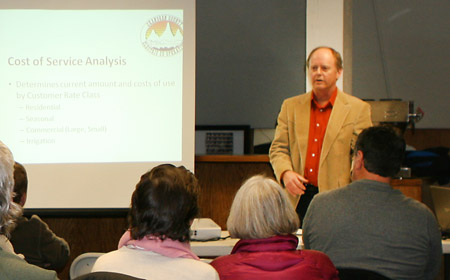home | internet service | web design | business directory | bulletin board | advertise | events calendar | contact | weather | cams

|
Electric Cooperative Talks Rate-Setting  David Gottula, the new general manager of the Okanogan County Electric Cooperative, explains to members the process for setting new electric rates for customers. - Photo by Solveig Torvik David Gottula, the new general manager of the Okanogan County Electric Cooperative, explains to members the process for setting new electric rates for customers. - Photo by Solveig TorvikMembers of the Okanogan County Electric Cooperative turned out for the first meeting of its kind Thursday evening to hear the utility’s new general manager, David Gottula, explain to the owners of the utility the rate-setting process that will take place over the next few months. The utility has undergone a contentious period stemming from the institution of a controversial demand charge that led to the replacement of some of the board members at election time and the resignation of the previous manager, Ray Ellis. Gottula stressed to an audience of about 35 people that the utility was focusing on how to fairly apportion costs among users. He laid out the rate-setting schedule and said he wants to keep open communication with members during the process. He also briefly addressed the Mazama circuit, explaining that after upgrades are made to the Wolf Creek feeder line, the Mazama line will be “good for five to seven years”. Then it was time for questions. One person wanted to know if it is possible for the coop to buy power from someone other than the Bonneville Power Administration. The answer: Not in the immediate future. Fred Wert wanted to know why government agencies, which he said use 12 percent of the coop’s power, aren’t put into a separate user class for rate-setting purposes. The answer: “A good idea.” Evelyn Vanderpool of Twin Lakes wanted to know: “Are we ever going to get rid of the demand charge?” She explained that she bought a new clothes dryer and before she turned it on, she read her meter. After she dried her clothes, she read it again. It cost her $15.34 “for a one time use of the dryer. That’s sickening. I went out and bought a drying rack. To me, it’s a rip-off.” She suggested the utility could save money if it installed windmills or solar panels. “I could live free,” she said. Bud Hover, Okanogan County Commissioner and president of the coop board, replied that solar and wind power are commercially viable only with government subsidy. “I’m from Germany. I see it (there) all over every house,” Vanderpool countered, alluding to solar panels. “Why can’t we have it?” In Germany, the government subsidizes it, came the answer. Besides, in winter, when we use the most electricity, the sun is least available to us. Hover explained that solar and wind power can't compete economically with hydroelectric power in this area.” Windmills are going up, he added, “because people are making money from the government on them.” Questions done, Gottula - to general laughter - addressed his wife, Susan, who was sitting in the back of the room. “Is that our moving van waiting out there?” Which brought this comment from one man in the audience: “I’d like to thank you for this meeting. It’s very different than when the demand charge was rammed down our throats.” There was even some applause, and someone called out: “Welcome to the Methow!” 11/18/2011 This is regarding Bud Hover's comments about the pricing of electric energy. While it is true that the hydroelectricity in Okanogan County is very cheap by world standards, a more global view of the situation in order. For instance, when the externalities associated with coal production such as mercury pollution, acid rain, mountaintop removal, excess human deaths and illness are eventually internalized, forward looking countries like Germany, and others, have seen that solar and wind energy are a bargain. When the projected costs of dealing with the effects of global warming are factored in, alternative energy is a no-brainer. This is why the German government has seen fit to subsidize these things. Not because of some fuzzy, green, ecothinking, but because of a complete, hard headed cost-benefit analysis. Mr. Hover would also appear to be down on government subsidies. I would remind Mr. Hover that huge federal subsidies have been given to, among others, railroads, aviation, space exploration, munitions manufacturing, agriculture, computers, medical science and, oh yeah, the Tennessee Valley Authority and the Bonneville Power Administration, from whom Okanogan County gets that nice cheap hydropower. Gordon Brackett
|